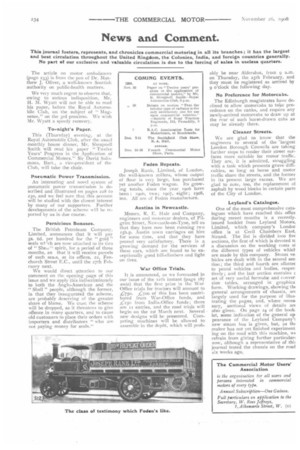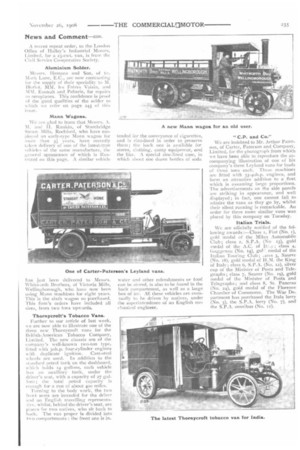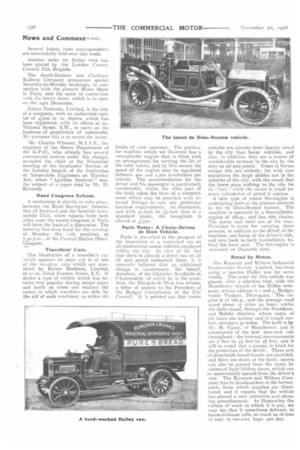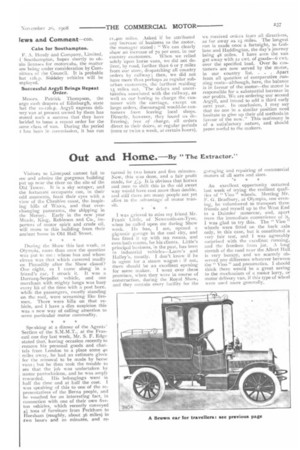News and Comment.
Page 8

Page 9

Page 10

Page 11

If you've noticed an error in this article please click here to report it so we can fix it.
This journal fosters, represents, and chronicles commercial motoring in all its branches ; it has the largest and best circulation throughout the United Kingdom, the Colonies, India, and foreign countries generally. No part of our exclusive and valuable circulation is due to the forcing of sales in useless quarters.
The article on motor ambulances (page 233) is from the pen of Dr. Matthew J. Oliver, a well-known Scottish authority on public-health matters.
We very much regret to observe that, owing to serious indisposition, Mr. H. M. Wyatt will not be able to read his paper, before the Royal Automobile Club, on the subject of " Magnetos," on the 3rd proximo. We wish Mr. Wyatt a speedy recovery.
To-night's Paper.
This (Thursday) evening, at the Royal Automobile Club, after the usual monthly house dinner, Mr. Shrapnell Smith will read his paper " Twelve Years' Prcq,Yress in the Application of Commercial Motors." Sir David Salomons, Bart., a vice-president of the Club, will take the chair.
Pneumatic Power Transmission.
An interesting and novel system of pneumatic power transmission is described and illustrated on pages 228 to 230, and we feel sure that this account will be studied with the closest interest by many of our supporters. Further developments of the scheme will be reported by us in due course.
Pernicious Bonuses.
The British Petroleum Company, Limited, announces that it will pay 5s. 6d. per hundred for the " gold " seals whzch are now attached to its tins of " Shea." spirit, for a period of three months, an that it will receive parcels of such sea,s, at its offices, 22, Fenchurch Street E.C., until the 27th February next.
We would direct attention to our comment on the opening page of this issue and we apply this indiscriminately to both the Anglo-American and the "Shell " people, although the former, in that they inaugurated the scheme, are probably deserving of the greater share of blame. We trust the scheme will be dropped, as it threatens to give offence in many quarters, and to cause old customers to place their orders with importers and distributors " who are not paying money for seals." Foden Repeats.
Joseph Rank, Limited, of London, the well-known millers, whose output of flour is very large, has purchased yet another Foden wagon. Its growing totals, since the year 1906 have been : two, two; 1907, eight; 1908, ten, All are of Foden manufacture.
Austins in Newcastle.
Messrs. R. E. blale and Company, engineers and motorcar dealers, of Pilgrim Street, Newcastle-on-Tyne, tell us that they have now been running two t5h.p. Austin town carriages on hire for some time, and that they have proved very satisfactory. There is a growing demand for the services of these cars, which are found to be exceptionally good hill-climbers and light on tires.
War Office Trials.
It is announced, as we forecasted in our issue of the 12th instant (page 187 ante) that the first prize in the War Office trials for tractors will amount to L:750. -1,-,5oo of this has been contributed from War-Office funds, and 4250 from India-Office funds; there are ii entries, and the road trials will begin on the 1st March next. Several new designs will be presented. Competing machines will be allowed to assemble in the depfit, which will prob ably be near Aldershot, from 9 a.m. on Thursday, the 25th February, and they must be registered as arrived by 9 o'clock the following day.
No Preference for 1Viotorcabs.
The Edinburgh magistrates have declined to allow motorcabs to take precedence on the ranks, and require any newly-arrived motorcabs to draw up at the rear of such horse-drawn cabs as may be already there.
Cleaner Streets.
We are glad to know that the engineers to several of the 'largest London Borough Councils are taking further steps to render their street surfaces more suitable for motor traffic. They are, it is admitted, struggling with a task which presents grave difficulties, so long as horse and motor traffic share the streets, and the former in its present large excess. We are glad to note, too, the replacement of asphalt by wood blocks in certain parts of the City of London.
Leyland's Catalogue.
One of the most comprehensive catalogues which have reached this office during recent months is a recently. issued booklet from Leyland Motors, Limited, which company's London office is at Cecil Chambers East, Strand. The list is divided into five sections, the first of which is devoted tc a discussion on the working costs oi the different types of vehicles whief are made by this company. Stearn ve. hides are dealt with in the second see. tion ; the third and fourth are allottec to petrol vehicles and bodies, respec. tively; and the last section contains i set of very useful formulm and conver. sion tables, arranged in graphica form. Working drawings, showing the general arrangements of chassis, art largely used for the purpose of illustrating the pages, and, where neces sary, sectional views of details are also given. On page 24 of the book. let, some indication of the general ap pearance of the Leyland Company't new steam bus is given, but, as tht maker has not yet finished experiment ing on the road with this machine, 1.;'4 refrain from giving further particular: now, although a representative of this journal tested the chassis on the road six weeks ago.
A recent repeat order, to the London Office of Halley's Industrial Motors, Limited, for a 25-cwt. van, is from the Civil Service Co-operative Society.
Aluminium Solder.
Messrs. Hemans and Son, of 61, Mark Lane, E.G., are now contracting tor the supply of their speciality to M. Illeriot, MM. les Freres Voisin, and MM. Esnault and Pelterie, for repairs in aeroplanes. This confidence is proof of the good qualities of the solder to which we refer on page 245 of this issue.
Mann Wagons. •
We are glad to learn that Messrs. A. M. and II. Rankin, of Stambridge Steam Mills, Rochford, who have employed an early-type Mann wagon for more than 5L. years, have recently taken delivery of one of the latest-type vehicles of the same manufacture, the general appearance of which is illustrated on this page, A similar vehicle has just been delivered to Messrs. Whitworth Brothers, of Victoria Mills, Wellingborough, who have now been using Mann machines for eight years. This is the sixth wagon so purchased. This firm's orders have included all sizes, from two tons upwards.
Thornycroft's Tobacco Vans.
Further to our article of last week, we are now able to illustrate one of the three new Thornycroft vans for the British-American Tobacco Company, Limited. The new chassis are of the company's well-known two-ton type, fitted with 3oh.p.four-cylinder engines with duplicate ignition. Cast-steel ‘N heels are used. In addition to the st;indard petrol tank on the dashboard, which holds 14 gallons, each vehicle has an auxiliary tank, under the driver's seat, with a capacity of 27 gallons; the total petrol capacity is enough for a run of about 400 miles. Turningto the body work, the two fr■ wit seats are intended for the driver and an English travelling representative, whilst, behind the driver's seat, are planes for two natives, who sit back to back. The van proper is divided into two compartments : the front one is in tended for the conveyance of cigarettes, and is zinc-lined in order to preserve them ; the back one is available for stores, clothing, camp equipment, end the like. A special zinc-lined case, in which ;AA-Kit one dozen hottles of soda
water and other refreshments or food can be stored, is also to be found in the back compartment, as well as a large box of ice. All these vehicles are eventually to be driven by natives, under the superintendence of an English mechanical engineer. " C.P. and Co."
We are indebted to Mr. Arthur Paterson, of Carter, Paterson and Company, Limited, for the photograph from which we have been able to reproduce the accompanying illustration of one of his company's three Leyland vans for loads of three tons each. These machines are fitted with 35-401.p engines, and form an attractive addition to a fleet which is assuming large proportions. The advertisements on the side panels. are striking in appearance, and well displayed ; in fact, one cannot fail to admire the vans as they go by, whilst their silent running is remarkable. An order for three more similar vans was placed by this company on Tuesday.
Italian Trials.
Ve are officially notified of the following awards :—Class 1, Fiat (No. 1), gold medal of the Milan AutomobileClub ; class 2, S.P.A. (No is), gold medal of the A.G. of it:.yclass 4, tiaggenatt (No. 4), goV. medal of the Italian Touring Club-' ,..iass 5, Saurer (No. 18), gold medal of H.M. the King of Italy ; class 6, S.P.A. (No. 12), silver cup of the Minister of Posts and Telegraphs; class 7, Saurer (No. 19), gold medal of the Minister of Posts and Telegraphs; and class 8, St. Pancras (No. 24), gold medal of the Florence Chamber of Commerce. The War Department has purchased the Itala lorry (No. 3), the S.P.A. lorry (No. 7), and' the S.P.A. omnibus (No. 12).
Several letters from correspondents are unavoidably held over this week.
Another order for Sirdar tires has been placed by the London County Council Fire Brigade.
The South-Eastern and Chatham Railway Company announces special Saturday-to-Monday bookings, in connection with the present Motor Show in Paris, and the same in connection with the heavy show, which is to open on the 24th December.
Urban Taxicabs, Limited, is the title of a company, with an authorised capital of £200 in is. shares, which has been registered, with its offices at zo, Victoria Street, S.W., to carry on the business of proprietors of rnotorcabs. We presume this is to secure the name.
'Mr. Charles Wheeler, M.I.A.E., the engineer of the Stores Department of the G.P.O., who already has several commercial motors under his charge, occupied the chair at the November meeting of the Graduates' Section of the London branch of the Institution of Automobile Engineers on Tuesday last, when " Ignition Systems " was the subject of a paper read by Mr. D. Kennedy.
Road Congress Echoes.
A conference is shortly to take place, between the Road Surveyors' Association of Scotland and the Scottish Automobile Club, when reports from both sides upon the recent congress in Paris will form the basis of a discussion. The meeting has been fixed for the evening of Monday, the II th proximo, at 7.30 p.m., at the Central Station Hotel, Glasgow.
Travellers' Cars.
The illustration of a traveller's car which appears on page 237 is of one of the lo-tzh.p. cars which are marketed by Brown Brothers, Limited, of 22-32, Great Eastern Street, E.C. It shows a type of vehicle which has become very popular during recent years and justly so when one realises the extent to which travellers are able, by the aid of such machines, to widen the limits of zneir journeys. The particular machine which we illustrate has a two-cylinder engine that is fitted with an arrangement for varying the lift of the inlet valves, and by this means the speed of the engine may be regulated between 400 and 1,200 revolutions per minute. The accommodation for the driver and his passenger is particularly comfortable, whilst the after part of the body takes the form of a compartment which may be provided with internal fittings to suit any particular business requirements. As illustrated, and with 30-inch by 3i-inch tires of a standard make, the brougham is offered at ,4,-320.
Paris Notes: A Chain-Driven de Dion Vehicle.
Paris is disturbed at the prospect of the imposition of a municipal tax on all commercial motor vehicles employed within the city. In view of the fact that there is already a direct tax on all oil and petrol consumed there, it is naturally believed that an additional charge is unnecessary. On behalf, therefore, of the Chambre Svndicale de l'Automobile, of which he is the president, the Marquis de Dion has written a letter of protest to the President of the Budget Commission of the City Council. It is pointed out that motor
vehicles are already more heavily taxed by the city than horse vehicles, and that, in addition, they are a source of considerable revenue to the city by the duty on oil and petrol. Users of horses escape this tax entirely, for with rare exceptions the large stables are in the suburbs of the city, with the result that the horse pays nothing to the city for its "fuel," while the motor is taxed for every cylinderful of petrol it aspires.
A new type of motor fire-engine is undergoing tests at the present moment in the de Dion-Bouton factory. The machine is operated by a four-cylinder engine of r/311.p., and has side chains. The pump and reels are at the rear. Provision is made for carrying three persons, in addition to the driver of the machine, one being at the driver's side, and two back to back immediately behind the front seat. The fire-engine is mounted on Dueasble tires.
Bread by Motor.
The Runcorn and Widnes Industrial Co-operative Society, Limited, has been using a one-ton Halley van for some weeks. The order for this vehicle was placed, after a selective trial, with the Manchester branch of the Halley company, whose address is r and 3, Bridgewater Viaduct, Deansgate. The engine is of r6h.p„ and the average road speed about 17 miles an hour, whilst the daily round, through the Frodsharn and Helsby districts, where many of the lanes are narrow and of rough surface, averages so miles. The body is by Mr. H. Eaton, of Manchester, and is constructed of the best seasened oak throughout : the internal measurements are 7 feet by 4i feet by 4 feet, and it will he noted that a canopy is fitted for the protection of the driver. Three sets of detachable bread boards are provided, and there are doors at the hack; access can also be gained from the front, by means of tight folding doors, which can be conveniently opened from the driver's seat. The Runcorn, and Widnes Company has its headquarters at the former town, from which supplies are distributed, and it reports that the vehicle has proved a very attractive and pleasing advertisement. As illustrating the variety of work to which it is put, we may say that it sometimes delivers, in house-to-house calls, as much as 16 tons of coal, in one-cwt. bags, per day.
Cabs lor Southampton.
F. A. Hendy and Company, Limited, I Southampton, hopes shortly to obain licenses for motorcabs, the matter IOW being under consideration by COMnittees of the Council. It is probable hat 1211.p. Siddeley vehicles will be
• mployed.
Successful Argyll Brings Repeat Order.
Messrs. Patrick Thompson, the arge cash drapers of Edinburgh, state hat the to-i2h.p. Argyll express delirely van at present owned by them has roved such a success that they have fecided to issue a repeat order for the tame class of van. During the period t has been in commission, it has run
21,400 miles. Asked if he attributed any increase of .business to the motor, the manager stated: "We can clearly show an increase of 70 per cent. in our country customers. When we relied solely upon horse vans, we did not deliver, by road, further than 6 or 7 miles horn our store, despatching all country orders by railway; then, we did not have more than perhaps 20 regular suburban customers, the furthest residing 15 miles out. The delays and uncertainties associated with the railway, as well as our having to charge the customer with the carriage, except on large orders, discouraged would-be customers from leaving local shops. Directly, however, they found us delivering, free of charge, all orders direct to their doors, at regular periods (once or twice a week, at certain hours), we received orders from all directions, as far away as 25 miles. The longest run is made once a fortnight, to Gullane and Haddin,gton, the day's journey being 48 miles. I have seen the van get away with 22 cwt. of goods-6 cwt. over the specified load. Over 8o customers are now served by the motor, in our country list. . . . Apart from all question of comparative running costs—although, here, the balance is in favour of the motor—the motor is responsible for a substantial increase in our profits. We are ordering our second Argyll, and intend to add a third early next year. In conclusion, I may say that no one in a similar position need hesitate to give up their old methods in favour of the new." This testimony is of a satisfactory nature, and should prove useful to the makers.




















